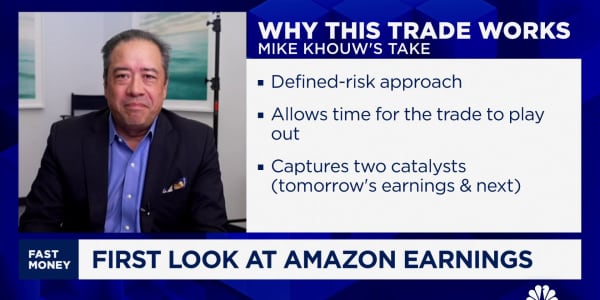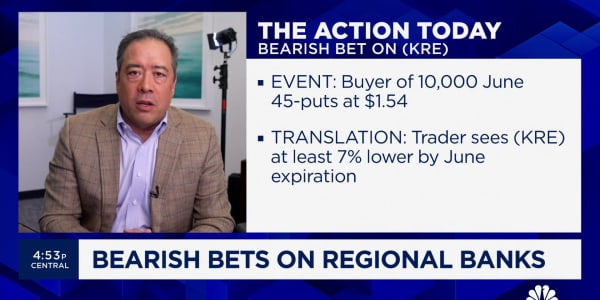The following post is a Guest Blog by CNBC Contributor Brian Stutland.
As the "fiscal cliff" nears, the market is beginning to wonder what going off the cliff will mean for the U.S. economy. One sector that is likely to be among the hardest hit is the defense sector, which is highly dependent on government spending for revenue.
Lockheed Martin CEO Robert Stevens recently said that going off the fiscal cliff would be "devastating." (Read More: Obama, Boehner Discuss 'Cliff' Compromise.)
That is because sequestration would mean funding cuts to all discretionary accounts, including a flat 9.4 percent cut to defense and a 8.2 percent cut across non-defense programs.
The stock ended 3 percent lower last week and saw unusually high put volume on Friday. The biggest trade of the day was the purchase of 20,000 January 80-strike puts for $0.40 each, which was done with the stock at $89.59. This is a bearish bet that the stock will be below $79.60, or 11 percent lower, at January expiration.
On Friday, Lockheed Martin signed a contract with the Pentagon for an order of 32 more F-35 Joint Strike Fighters, at $107 million apiece. The development of this fighter jet has been plagued by cost overruns, which has made it the most expensive weapons program in U.S. history, and also made it a symbol of military wastefulness.
Last year it was estimated that the total cost to the Defense Department for 2,443 of the planes desired, along with their operating expenses, would be over $1 trillion—or larger than the entire GDP of Australia.
With so much government money going to defense companies like Lockheed Martin, it is difficult to imagine a fiscal cliff deal that does not cut at least some of the Pentagon's defense budget. The big question will be how much of this budget gets cut—and that is anyone's guess.
(Read More: Buffett Expects 'Fiscal Cliff' Fix, but Not by December 31.)
Buying puts on Lockheed Martin is one of the better ways to play the fiscal cliff. As we approach the end of the year without a deal, the stock is likely to sell off. And any deal we do get will likely include some cuts to the defense budget, which could also push this stock down. The key to this trade is to keep a favorable risk/reward profile by buying January puts that are about 10 percent out of the money.
If Lockheed Martin approaches the strike bought, I would take profits on the trade and move on to the next one, instead of holding short stock after expiration.
Brian Stutland is Managing Member of Stutland Equities and a contributor to CNBC's "Options Action."
Watch "Options Action" on CNBC Fridays 5:00 p.m. ET, Saturdays at 6 a.m. ET and on Sundays at 6 a.m. ET.
Questions, comments send them to us at:
No Disclosures.





